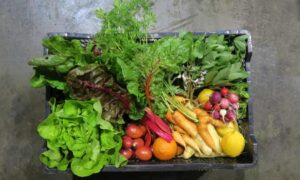
A pilot scheme to replace cardboard produce boxes with reusable plastic crates has been launched in Victoria, with the aim to cut “invisible” cardboard waste.
The Victoria Unboxed project, led by the food charity Sustain with Sustainable Victoria, has supplied 1,000 reusable plastic crates to transport produce from farms to venues, wholesalers and homes across Melbourne. The trial aims to reduce the need for single-use packaging, including cardboard, plastic and paper waste.
The executive director of Sustain, Nick Rose, said the trial has been a success, with some farms transporting all, or nearly all, of their produce in reusable crates.
Rose said packaging waste was an “invisible issue”.
“When people think about waste and food they think about what gets thrown out, food going off in the fridge, thrown into bins thrown into landfill and that’s certainly a major issue,” he said. “But further back in the supply chain, there’s actually a large amount of food packaging waste, which is a big problem.”
Farmers were particularly interested in the trial, he said, because reducing single-use cardboard, wax boxes or polystyrene means they don’t “continually have to purchase packaging”, resulting in cost savings.
Jennifer Macklin, a senior researcher at Monash University’s Monash Sustainable Development Institute, said the shift away from single-use plastics has led to more reliance on single-use fibres such as cardboard, bamboo and paper. That’s an improvement but not a solution.
“Single-use generally is bad,” she said. “We need to move away from this idea that we can have a single-use item and it’s OK because it gets recycled, to realising that it’s not nearly as good as utilising reusable materials.”
Large amounts of water is required to create cardboard, grow trees and produce paper, and that can have a greater environmental impact than reusable plastic, Macklin said. With less structural integrity than plastic, some cardboard and paper materials are not as “fit for purpose” as reusable vessels.
We have this idea that plastic is bad and cardboard or paper is better because one is synthetic and leads to litter and the other is natural and it’ll break down or get recycled but that’s an oversimplified narrative,” she said. “For reuse to be better, it has to be reused over and over again, and it’s much easier to make that happen with plastic, and in commercial situations.”
Macklin said while reusable containers would result in savings over time, businesses may need support to cover the upfront costs.
The fruit and vegetable wholesaler Natoora has introduced 960 crates into its supply chain through Victoria Unboxed in the past 12 months in an effort to reduce the 14.4 tonnes of cardboard waste generated annually in the business.
